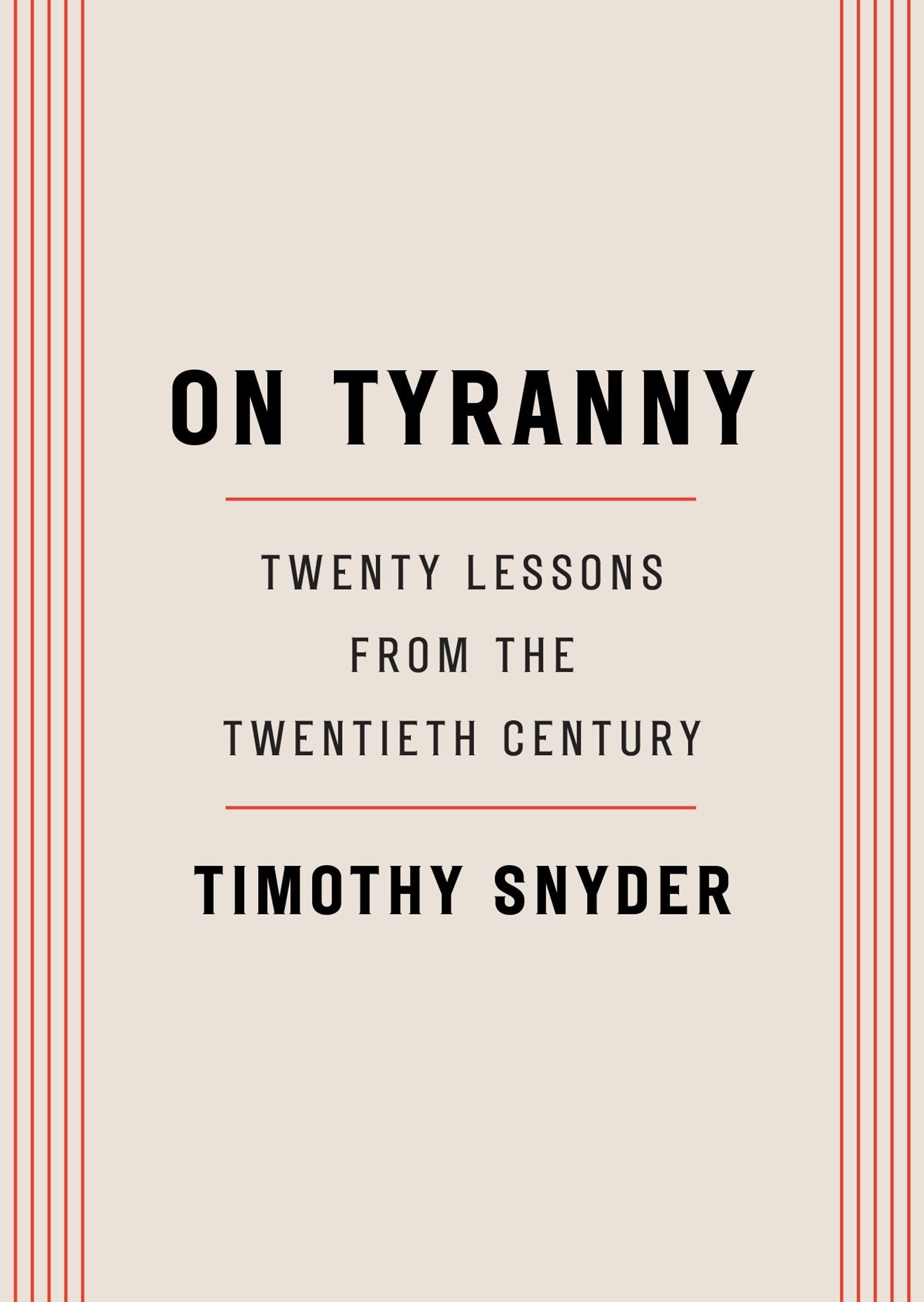How to Stop Fascism (updated)
Five Lessons of the Nazi Takeover
As the United States hovers at the edge of fascism, the history of Germany can help.
To be sure, Americans have other histories to ponder, including their own. Some American states, right now, are laboratories of authoritarian rule (and others are laboratories of resistance). The American 1860s and American 1930s reveal tactics authoritarians use, as well as the weaknesses of the American system, such as slavery and its legacy. At those times, though, Americans were lucky in their leadership. Lincoln and Roosevelt were in office at the critical moments.
We lack the experience of the collapse of the republic. And now we are confronted with people in power who wish to bring it down.
We can certainly learn from contemporary authoritarian success, as in Russia and in Hungary, which I have written about elsewhere. Yet the classic example of a major economic and cultural power collapsing into fascism remains Germany in 1933. The failure of the democratic experiment in Germany led to a world war as well as the Holocaust and other atrocities.
Yet today a taboo hovers around anything concerning Hitler. As soon as the collapse of the German republic in 1933 is evoked, American voices commence a fake lament — America is uniquely good so nothing about Nazis can ever apply, and/or Hitler was uniquely evil and so nothing concerning him is relevant.
To be sure, every person and every event is in some sense unique. But history is precisely the interaction of individuals and situations which, seen in isolation, will appear unique. The taboo on fascist history shoves people back to a turbulent present, leaving them feeling more helpless. That helplessness is an element of the fascist takeover.
The lessons from Germany that I present below are not at all original. We have been trained by digital media to believe that only what happens right now matters. But the people who intend to destroy the American constitutional republic have learned from the past. One of the basic elements of Project 2025, the architects of which are now close to taking power, is what the Nazis called Gleichschaltung: transforming the civil service into a fascist nest.
Those who wish to preserve the American constitutional republic should also recall the past. A good start would be just to recall the five basic political lessons of 1933.
1. Voting matters. Hitler came to power after an election which enabled his appointment as head of government. It is much easier for fascists to begin from within than to begin from without. Hitler’s earlier coup attempt failed. But once he had legitimate power, inside the system as chancellor (prime minister), he could manipulate it from within. There were no meaningful elections between the ones that helped bring Hitler to power and the aftermath of the Second World War. As of now, we are at the stage where we must act as best we can to ensure that there are elections in 2026.
2. Coalitions are necessary. In 1932, in the crucial German election, the far left and the center left were separated. The reasons for this were very specific: Stalin ordered the German communists to oppose the German social democrats, thereby helping Hitler to power. To be sure, the American political spectrum is very different, as are the times. Yet the general lesson does suggest itself: the left has to hold together with the the center-left, and their energies have to be directed at the goal rather than at each other.
3. Conservatives should be conservative. Which way the center-right turns can be decisive. In Germany in 1932, conservatives enabled the counter-revolution. They did not see Hitler and his Nazis as something different from themselves. They imagined, somehow, that Hitler would preserve the system rather revolutionize it. They were wrong, and some of them paid for the mistake with their lives. As in American today, the German “old right” was less numerous than the “new right,” the fascists. But how the traditionalist center-right acts can very well make the difference.
4. Big business should support democracy. In the Germany of the 1930s, business leaders were not necessarily enthusiastic about Hitler as a person. But they associated democracy with labor unions and wanted to break them. Seeing Hitler as an instrument of their own profit, business leaders enabled the Nazi regime. This was, in the end, very bad for business. Although the circumstances today are different, the general lesson is the same: whether they like it or not, business leaders bear responsibility for whether a republic endures or is destroyed.
5. Citizens should not obey in advance. Much of fascism is a bluff — look at our loyal cult, listen to our outrageous language, heed our threats of violence, we are inevitable! Hitler was good at that sort of propaganda. Yet to gain power he needed luck and the errors of others. American fascism, likewise, is far from inevitable. It too is largely bluff, most of it digital. The internet is much more fascist than real life, which is discouraging. The crucial thing is the individual decision to act, along with others, for four months, a little something each day, regardless of the atmospherics and the polls and the media and the moods.
It’s simple: recalling history, we act in the present, for a future that can and will be much better.
Updated 23 November 2025





Tim, I have been looking, watching, hoping to hear from you.
This is a perfect salutation the day after marking American independence from Britain, a mere 250 years ago. I do canvass for a party, but I knock every door and engage every neighbor for my grandchildren’s future — that we/they should not revisit the history of my family in 1930s Germany and 1950’s McCarthy America.
Thank you
As someone who grew up in the shadow of WWII, I'm always amazed at how ignorant so many Americans are about fascism and the rise of Hitler. The first paragraph ("Voting") demonstrates that we are truly skating on thin ice. Thanks so much for this opinion piece. We needed to hear it.